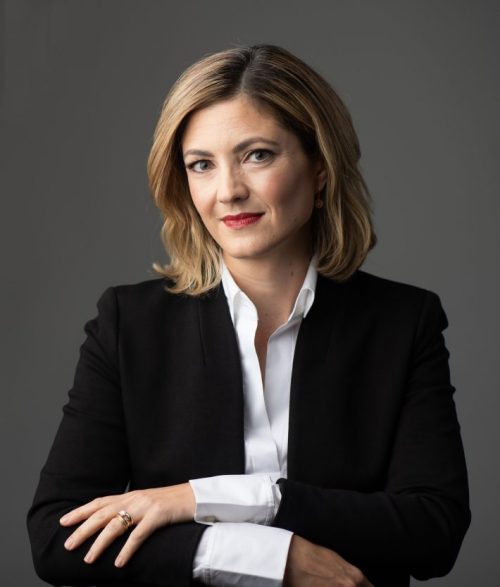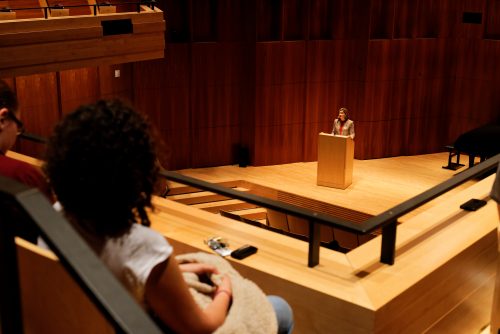Keynote Speaker
Elizabeth Rowe
Elizabeth Rowe is the principal flutist of the Boston Symphony Orchestra. As a member of that world-class ensemble, her playing can be heard on numerous Grammy-award winning recordings. The New York Times has called her a “divine flutist” and her playing “ravishing.” In addition to her role as principal flutist, her artistic contributions to the orchestra include well over two dozen concerto appearances, and numerous chamber music performances with the Boston Symphony Chamber Players. She has also been a featured soloist on both national and international tours with the BSO, since joining the orchestra in 2004.
Elizabeth attracted international attention in 2018 when she filed an Equal Pay lawsuit against the orchestra. The lawsuit, considered to be the first of its kind in her industry, was covered by the New York Times, the Boston Globe, NPR, CNN, Time Magazine, The New Yorker, and Slate.com, as well as numerous other national and international news outlets. It ultimately led to an extensively researched article in the Washington Post that exposed a significant gender pay gap within the orchestral music industry. Following this, the Boston Globe recognized her in its annual Bostonian of the Year feature, calling her “The Fighter.” Elizabeth and the BSO successfully mediated the case in 2019, and she remains a dedicated member of the orchestra.
By shining a light on pay practices within her industry, Elizabeth’s actions continue to generate conversation and raise new questions within her field. Katie Couric recently interviewed her for one of the first editions of the daily newsletter “Wake-up Call.” Elizabeth joined other national leaders in the struggle for social justice at Ellevate Network’s 2019 Mobilize Women summit, speaking on a panel titled “Removing the Silence.” And her recent TEDx talk, “The Lonely Onlys; Transformed by Imagination and Vulnerability” has added an additional, more personal, dimension to her work as an advocate.
Elizabeth has spent years helping to educate and train aspiring flutists, through public masterclasses, private lessons, and her work at both the New England Conservatory of Music and the Tanglewood Music Center. Beyond this work, she is committed to mentoring the next generations of musicians and artists, empowering them to skillfully navigate and courageously lead their industries. She is also deeply interested in building bridges and fostering connections between people in all fields who seek to have an impact in their places of work.
Conference Agenda
Please see the schedule below for titles and descriptions of workshop sessions
| Time | Overview of Activity | Location |
| 8:30 am to 9:30 am | Conference Check-In | Lowry Hall |
| 9:30 am to 10:30 am | Keynote: Elizabeth Rowe | Hatch Recital Hall |
| 10:30 am to 10:45 am | Break | |
| 10:45 am to 11:30 am | Session 1 | Various |
| 11:30 am to 12:30 pm | Lunch (ticketed event) | Sproull Atrium |
| 12:30 pm to 1:15 pm | Session 2 | Various |
| 1:15 pm to 1:30 pm | Break | |
| 1:30 pm to 2:15 pm | Session 3 | Various |
| 2:15 pm to 2:30 pm | Break | |
| 2:30 pm to 3:30 pm | Facilitated Community Conversation | Hatch Recital Hall |
Session 1
No Gender Equity without Intersectionality: A Panel on Women, Race, Ethnicity, and Sexuality
Kodak Hall (Session 1.1)
Presenters: Brianna Garcon, Alexis Peart, Sophia Moreira, Lissa Reed, Payton Dziekan, Deepti Kumar
No Gender Equity without Intersectionality will lead a panel discussion on microaggressions, representation, and other adversities experienced by women from marginalized groups. The panel, comprised of current Eastman students, will engage the participants with personal statements about how their own identities have shaped their experience in music. Participants will leave this session with a stronger understanding of intersectionality within music.
Power, Consent, & Agency in the Performing Arts
Hatch Recital Hall (Session 1.2)
Presenter: J.C. Meyer-Crosby
This session will explore power dynamics in the performing arts industries and their effect on a consent-based art form. The session will examine why consent is important, what it looks like, why it isn’t prioritized, and how to foster it in the music industry. Intimacy Director and Consent Educator J.C. Meyer-Crosby will give special attention to how the gender-related power dynamics of consent affect the arts in particular. He will also discuss how the field of intimacy direction has been embraced in the world of opera as one facet of how to build a consent-based practice and limit sexual harassment.
Women Mean Business: Intersectionality and Equity on the Bandstand
EES 415 (Session 1.3)
Presenters: Naomi Nakanishi, Grant Le, Ryan Brasley, Lael Dratfield, Luisa Hidalgo, Rafael Enciso, Stephanie Tateiwa
The women of Eastman’s jazz department will discuss topics relating to unconscious gender bias, intersectionality within the bandstand, and the history behind femme/non-binary musicians in order to provide a new perspective on progressive professionalism in the music scene. The Women Mean Business team will lead a series of interactive scenarios where participants will practice using LGBTQ+/POC-friendly language.
Creating an Inclusive and Safe Space for LGBTQ+ Individuals/Communities through a Trauma-Informed Lens
Ranlet Lounge (Session 1.4)
Presenter: Tiffany Street
This session will help participants learn how to implement tools to create a safe, welcoming environment for LGBTQ+ individuals and communities through trauma-informed approaches and best practices. Participants will learn LGBTQ+ diverse terminology and be able to utilize it correctly, learn the “Do’s and Don’ts” of pronouns, and gain a better understanding of the stark statistics that LGBTQ+ individuals and communities face as they directly relate to their sexual orientation, and gender identity or expression.
Male Privilege: What It Is and How to Address It
Sproull Atrium (Session 1.5)
Presenters: John Kapusta, Zachary Bernstein, Glenn Mackin, Stephen Carr
Privilege is a difficult concept. While common in conversations about equity, talking about privilege can make people uncomfortable, even angry. But this need not be the case. This session addresses these issues, focusing on the idea of male privilege in the field of music. The session is interactive and aims to be an open conversation regarding privilege.
Session 2
Results of AAU Campus Climate Survey on Sexual Assault and Misconduct
Kodak Hall (Session 2.1)
Presenter: Morgan Levy
During this interactive session participants will explore the results of the University’s 2019 AAU Campus Climate Survey on Sexual Assault and Misconduct and discuss the steps that have been taken within the Eastman community in response to those results over the past academic year. Participants will explore research based strategies for removing barriers typically faced by women and other gender minorities and will engage in thoughtful small group conversation regarding programs, policies, and resources that may assist in ensuring that the Eastman community continues to develop musicians committed to equity and inclusion.
Gender Inequity in Band: How to Tackle Issues from the Beginning
Ranlet Lounge (Session 2.2)
Presenters: Casidy Reed
This session will focus on gender equity in band programs from beginners through high school and beyond. Participants will be provided with data on gender equity in music programs and strategies as to how we can solve equity issues. The presenter will use her school district’s program and experiences as a teacher along with her research findings to address and provide strategies regarding gender, sexuality, and instrumentation.
fivebyfive: Chamber Music Programming of Women Composers
Hatch Recital Hall (Session 2.3)
Presenters: Laura Lentz, Sungmin Shin, Marcy Bacon, Eric Polenik, Haeyeun Jeun
fivebyfive is a Rochester, NY-based quintet formed in 2015 with a mission to engage audiences in the collaborative spirit and creativity of modern chamber music by commissioning, arranging, and performing a wide range of works for its instrumentation. In this session, fivebyfive will discuss their experience commissioning and performing works by female composers as part of their ongoing initiatives to advocate for diversity, inclusion, and representation in their concert programming. This presentation will include performances of works by Edie Hill, Jung Sun Kang, and Julia Seeholzer.
Classical Music’s #MeToo Movement
Sproull Atrium (Session 2.4)
Presenters: Gaia Saetermoe-Howard, Elizabeth Easley, Katherine Ciesinski,
Jean Pedersen, Beyond Consent Members
This workshop will provide historical information surrounding the #MeToo movement in classical music and discuss current issues and case studies at other conservatories. The presenters will encourage participants to engage in open dialogue about these case studies and to explore avenues to address these issues. The goal is for participants to leave feeling more comfortable discussing these issues by approaching them from concrete policy and justice-based standpoints.
Session 3
Including Women Composers: A Conversation with Women in Music Festival Founder
Kodak Hall (Session 3.1)
Presenters: Philip Silvey, Sylvie Beaudette
In this session, Eastman Women’s Chorus Conductor, Philip Silvey, will lead a conversation with Sylvie Beaudette, founder of Eastman’s Women in Music Festival, about her role in the development and oversight of this 10-year event. Philip will also share his evolution as a conductor who participated in the festival and now purposefully includes repertoire written by women composers in all of his concert programs. This conversation aims to sensitize students, faculty, performers, and conductors to consider their own potential biases when selecting repertoire.
Breaking Gender Molds: Leadership in Performance and Administration
Ranlet Lounge (Session 3.2)
Presenters: Rachel Roberts, Sarah Forestieri, Melissa O’Hara
This session will examine music leadership through two perspectives of independent study research: gender-based opportunities in opera administration and gender composition programming in higher education ensembles. The presenters aim to spur conversations of future gender equity developments throughout the music industry, specifically how to empower students to lead future change.
Being a Gender-Fluid Singer: Performance and Q & A
Hatch Recital Hall (Session 3.3)
Presenters: Liz Bouk, Zachary Peterson, Katherine Ciesinski
As singers become more open about their gender identities, how do those identities affect opera repertoire? Join Mr. Liz as he sings his way into a conversation about gender fluidity in opera, his own experience as a transman, and how his coming out has shaped his artistic choices. Katherine Ciesinski will moderate a talk-back following the presentation.
Moving from Barriers to Opportunities: Overcoming Stereotypes around Gender-Specific Instruments
Sproull Atrium (Session 3.4)
Presenters: Blaire Koerner, Gaelen McCormick, Tierney McLean
Revealing the challenges young females face when selecting traditionally “male” instruments, this session will highlight opportunities to remove barriers and encourage females to pursue any instrument. Presenters will offer resources and steps that educators, musicians, administrators, and community members can utilize to assist female students in their growth to become instrumentalists.
